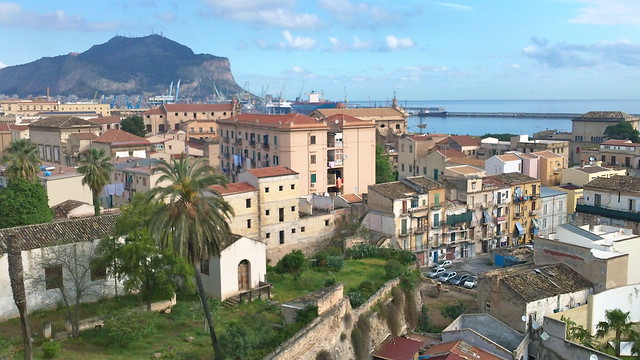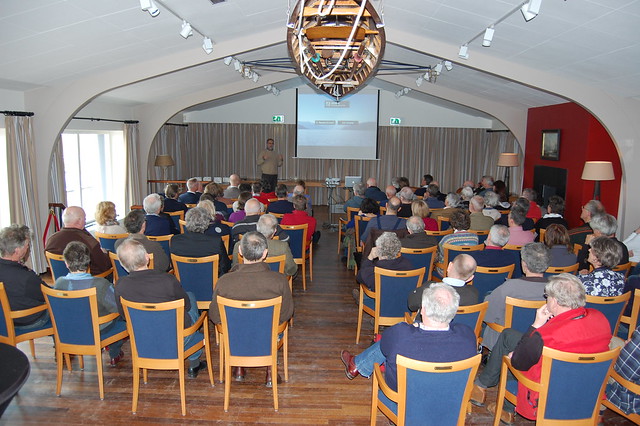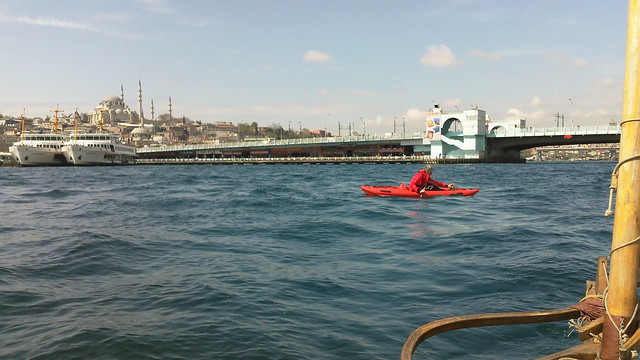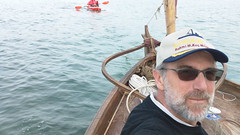
Palermo is sumptuous and obscene. Palermo like New Delhi, where the fabulous palaces of the Maharajas lay next to the bodies of the dying pariah. Palermo like Cairo, where putrid hieroglyphs of shacks lay next to forests of skyscrapers and gardens.
Palermo is like all the capitals of those people who never managed to be a nation. In Palermo, the corruption is physical, tangible and aesthetic: It’s a beautiful woman, rotten by bad moods, with black fingernails, but also so mysteriously beautiful. Palermo is Sicily’s history, cowardice and heroism, despair, fury, defeats, rebellions. Palermo is also Spain, the Moors, the Swabians, the Arabs, the Normans, the Angevins: No other city is as Sicilian as Palermo, but Sicilians don’t love it.
Those living on Sicily’s west coast unwillingly recognize Palermo as their capital city, but never feel citizens. Those living on the east coast are proudly saying that they belong to a different race: Sicani in Palermo and Siculi on the East (according to Giuseppe Fava).
In the very same place from where I’m writing, a man said: “In the public garden near the harbour, I spent a few hours of wonderful, lonely time. Monte Pellegrino: The most beautiful promontory in the world” (Johann Wolfgang von Goethe).
 I went back to one of the milestones of my existence. My great-grandfather was from Palermo, as my surname can tell. But what’s even more interesting is how my ancestors arrived here: They came in 1100 from the far north, Scandinavia, perhaps Norway.
I went back to one of the milestones of my existence. My great-grandfather was from Palermo, as my surname can tell. But what’s even more interesting is how my ancestors arrived here: They came in 1100 from the far north, Scandinavia, perhaps Norway.
My destiny is bound to follow these routes: north-south, east-west and all the fourths (the wind rose is divided into fourths) in between. And of course, is bound to boats too. I’m one of the many nomads of the rivers and seas.
In these two months I have seen in many lands, always along rivers and seas.
After 7 meetings in Mallorca, I was invited to tell my story by the Navy League of Chioggia, by a wonderful Waldorf school in Cittadella, by Lago in Villa del Conte, where I’ve met again all my friends, and eventually ended up in Chamonix, to see Tom Greenall’s skis, the “greenest” in the world (www.idriskis.com). I’ll use them in an upcoming project where I’ll take on the snow.
 Then I’ve moved to Luxembourg, where I’ve been the Altrimenti bookshop (www.altrimenti.lu) run by Diego Lo Piccolo, a place of exchange and culture of respect and sustainable innovation, and in the Lago Store (luxembourg.lagostore.net).
Then I’ve moved to Luxembourg, where I’ve been the Altrimenti bookshop (www.altrimenti.lu) run by Diego Lo Piccolo, a place of exchange and culture of respect and sustainable innovation, and in the Lago Store (luxembourg.lagostore.net).
Eugene and his wife hosted me with fondness and the great participation of young people did not surprise me.
Then a dream in Muiden, Royal Dutch Yacht Club, founded in 1847 (www.knzrv.nl) in a magical place, host by the Drascombe Association (www.drascombe.nl). Here the word Yachting was born.

Thanks to all members: I was truly honored and impressed by their warmth. Wherever I’ve been I could see snow (also in Mallorca on top of the Puig Major).
 Even in London it was snowing and there were flowers. I met again Ali, Steffan Meyric Hughes and all the editors of the world’s prestigious Classic Boat magazine who awarded me of the prize as Person of the Year.
Even in London it was snowing and there were flowers. I met again Ali, Steffan Meyric Hughes and all the editors of the world’s prestigious Classic Boat magazine who awarded me of the prize as Person of the Year.
A special meeting was that with Polly Higgins, (www.pollyhiggins.com) a lawyer who has been fighting to recognize the crime of Ecocide. A brief contact to Cisco took me to a meeting with Neil Harris, the international responsabile for environmental policies of the computer giant, and we may gather their support too.
 In a week, I traveled a few hundred miles by subway and feet to make possible very enriching meetings. I’ve seen a project for floating houses in Hampton Court, aiming to improve and simplify life over water, without destroying or occupying the land that’s already so polluted by humans.
In a week, I traveled a few hundred miles by subway and feet to make possible very enriching meetings. I’ve seen a project for floating houses in Hampton Court, aiming to improve and simplify life over water, without destroying or occupying the land that’s already so polluted by humans.
After London, even more meetings in Venice, where we plan to begin a collaboration with the department of Business Administration of Ca’ Foscari University, for a healthier economy and environment.
Then, in Istanbul, to see Clodia again. I had Breakfast with all the beautiful people of the Museum, hosted by Bruno Cianci, which also made me sail on his cutter from 1910.

And then, short of training, I crossed the Bosphorus by oars and sails in an hour and a half to accompany Guido Morandini from Rai 5.
 I must say that finding Clodia, rowing and sailing was like rejoining a part of myself. Gestures and movements without effort, despite the waves, traffic, etc.
I must say that finding Clodia, rowing and sailing was like rejoining a part of myself. Gestures and movements without effort, despite the waves, traffic, etc.
Now I’m in Palermo and this city has bewitched me. In the amazing botanical garden, under a huge ficus trees and with mountains all around is difficult not to feel united to Goethe in his commentary, despite the criminal folly of urbanization without sense and respect.
Hidden by cement, under Palermo flow two rivers that formed, along with the Oreto, this alluvial plain and the safe harbor, the all-port (Pan-Ormos in Greek) founded by the Phoenicians, who were perhaps from the north. Very much from the north. Forgotten rivers.
A nice documentary, (http://www.igordindia.it/#!/video/29122857) tells of the Oreto and how people do not even know that it exists, the violent daily dumping of fluids and things that should end up elsewhere. Igor d’India has walked all the way up to the source. Touching and disturbing.
Why do we hate nature so much?
The adventure of www.bewater.info keeps going. I will sail around Mallorca this summer with a traditional boat, to bring attention to the good and bad things of this beautiful island. We are working on our blog.
See you soon
g
























” My great-grandfather was from Palermo, as my surname can tell. But what’s even more interesting is how my ancestors arrived here: They came in 1100 from the far north, Scandinavia, perhaps Norway.”
Aha! I knew it, you’re a Viking! You pulled Clodia from deep within your bones, where she lay hidden for a thousand years. Welcome home –we’ll be happy to claim you.
Oh yes Mike,
thank you so much. I always felt more comfortable on boats, expecially double enders, frozen water, snow and an unbearable attraction for traveling. And I love the south too, the crystal waters, the melting pot of this lake with a lot of mountains around: the Mediterranenan. Where everywhere you can see, at least in winter, snow around. I think that was perfect for nostalgic Vikings. They couldn’t leave that paradise with spices, beautiful women, warm waters, gold, and rich empires..but how could they forget the snowcapped mountains, the pine forrest, the berries all around..Well, here, in just some hours walking you can find all that.
But anyway I am one of those who will try to go back to North. First or then. And with a boat. “Bundin er båtlaus madur”
Best g